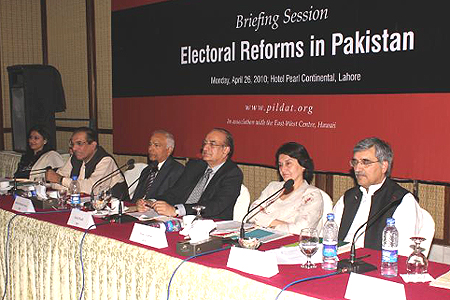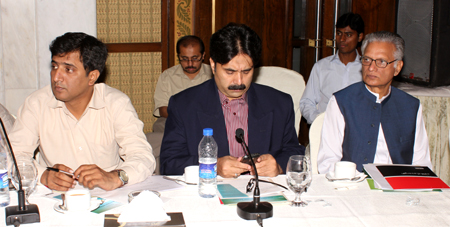|
|
| |
| EVENTS |
|
|
> Now is the time to institute Electoral Reforms: CGEP
|
|
|
| |
Lahore, April 26; Media and other stakeholders must play a crucial and much-needed role in instituting electoral reforms in Pakistan at this stage and create an atmosphere in which the Government, the ECP and the Parliament move fast for the preparation of a good Voters' List, said members of the Citizens Group on Electoral Reforms � CGEP while sharing CGEP proposals on Electoral Reforms and Computerised Electoral Rolls at a Briefing held by PILDAT. Electoral Reforms require changes in laws, rules and practices and therefore meaningful reform can only be brought in at this stage, believed CGEP. |
|
| |
Key members of CGEP, who outlined Electoral Reforms at the Briefing, included Mr. Shahid Hamid, former Governor Punjab; Mr. Mujib-ur-Rehman Shami, Editor-in-Chief Pakistan, Dr. Hasan-Askari Rizvi, Dfence and Political Analyst; Justice (Retd.) Nasira Iqbal, former Judge Lahore High Court and Mr. Ahmed Bilal Mehboob, Executive Director PILDAT. Dr. Shabbir Cheema, Director Asia Pacific Governance Democracy Initiative, East West Centre, Hawaii, a noted expert on democracy and governance in Asia, also spoke at the Briefing. A large number of media representatives, analysts, talk-show hosts, reporters and columnists participated in the briefing and offered valuable proposals and feedback.
|
|
| |
Initiating the briefing, Ms. Aasiya Riaz, Joint Director PILDAT, said that PILDAT facilitated the formation of the CGEP in 2006, with the avowed goal of contributing towards the holding of free, fair and credible elections in Pakistan. A number of well-known personalities from the media, legal profession, civil society and former members of the superior judiciary and armed forces, but with no present affiliation with any political party, have been serving as members. The CGEP has played a key role in monitoring of the electoral process ahead of February 2008 General Elections and is now working to institute Electoral Reforms. The CGEP has recently presented its electoral reform proposals to the Prime Minister of Pakistan and the Chief Election Commissioner of Pakistan, amongst others. The proposals have been very well received and are now being shared with the media for input. The CGEP electoral reform proposals were also shared with the Parliamentary Committee on Constitutional Reforms and some of those have also been adopted and are reflected in the 18th Constitutional Amendment and now part of the Constitution of Pakistan. |
|
| |
Outlining key proposals at the Briefing, Mr. Shahid Hamid said that three key reform proposals of CGEP have already been made part of the Constitution through the 18th Constitutional Amendment including the process of appointment of the Chief Election Commissioner, composition of the Election Commission and Caretaker Governments. The CGEP had proposed that the CEC should be appointed after a meaningful process of consultation with the leaders of all major political parties and groups represented in the National Assembly of Pakistan. After the 18th Constitutional Amendment, Article 213 has been amended and defines a process of consultation involving the Prime Minister and the Leader of the Opposition who will �forward 3 names for the appointment of the CEC to a Parliamentary Committee for hearing and confirmation of any one person.� The CGEP had also proposed that the CEC and other members of the ECP Do Not Have To Be Necessarily from the Judiciary. Retired Judges Should Not Be Appointed as Chief Election Commissioners directly after Retirement and A judge should not be appointed as CEC or a member of the Election Commission before the expiration of 3 years after he/she has ceased to hold the position of a judge of the Supreme or High Court. Article 207 (2) of the Constitution will need to be amended to implement this proposal. Mr. Shahid Hamid said that prior to the 18th Constitutional Amendment, the CGEP had proposed that since Provincial Election Commissioners only work as part-time commissioners with their chief responsibilities as judges in the High Court, an amendment is required to substitute the current ECP structure with 3-5 Full-Time Election Commissioners alongside the Chief Election Commissioner. The 18th Constitutional Amendment incorporates this proposal through which, in addition to the CEC, four (4) members from each Province are to be appointed to constitute the Election Commission. CGEP Electoral Reforms also include the need for an updated computerized Electoral Roll and enrollment as a Voter at the time of making of Computerised National Identification Cards (CNICs) using NADRA's expertise. CGEP has also proposed placing checks on the office of the President and the Governors from influencing the electoral process. The disclosure and declarations by the candidates should be made public before every election. The Election Commission should compose of permanent members, the CGEP proposes while advocating reforms such as live posting of polling stations wise (progressive) voting results on the ECP website; an agreed Code of Conduct by political parties; strict compliance of Laws by the ECP to control Government influence; setting up of a realistic ceiling on maximum election expenses and application of electoral rules and laws on all. The CGEP has also proposed a system of appointing Election Observers from amongst public officials by the ECP in every district to ensure compliance of electoral rules and laws and to report back to the ECP in time for action. |
|
| |
Outlining CGEP reforms on Computerised Electoral Rolls, Mr. Ahmed Bilal Mehboob said that CGEP firmly believes that in view of the fact that the process of preparing fresh computerised Electoral Rolls was apparently faulty in its design and execution in 2007, wide-spread lack of trust was expressed about the draft computerised Electoral Rolls, eventually the Supreme Court had to intervene and suggest remedial measures as the General Election 2008 was imminent, the then Chief Election Commissioner and other responsible officials apparently did not make any meaningful effort to use the NADRA database in the interest of accuracy, integrity and economy of Electoral Rolls preparation, and huge public funds and international financial assistance were apparently mis-spent, the CGEP has recommended to CEC to conduct an enquiry and publish a detailed report. The CGEP believes that the CEC, who is Constitutionally responsible for updating the Electoral Rolls in Pakistan, and the Election Commission of Pakistan (ECP) together with the National Database and Registration Authority (NADRA) should institute a system whereby voter registration is carried out at the time of issuance of Computerised National Identification Cards (CNICs) by NADRA as a one-window operation. The existing Electoral Rolls should be updated and made error-free using the NADRA database. The Computerised Voting Lists should be updated to include the photographs of voters. The Computerised Voters List should be available at the ECP website, and through the use of technology through mobile phone queries by registered voters. For a nominal fee, these should be available in the form of CDs, to any citizen or political party which wants to obtain them. |
|
| |
The participants offered many suggestions including public finance of political parties, a combination of proportional representation and first-past-the-post system through vote for political parties instead of candidates and setting of a minimum percentage of votes needed to win an election, etc. |
|
| |
The PILDAT Briefing has been organized under project titled Electoral and Parliamentary Process and Civil Society in Pakistan, in partnership with the East-West Centre, Hawaii and supported by the United Nations Democracy Fund. |
|
| |
|
|
| |
|
|
| |
|
|
| |

|
|
| |
|
|
| |

|
|
| |
|
|
| |

|
|
|
|
|
|
|
|
|